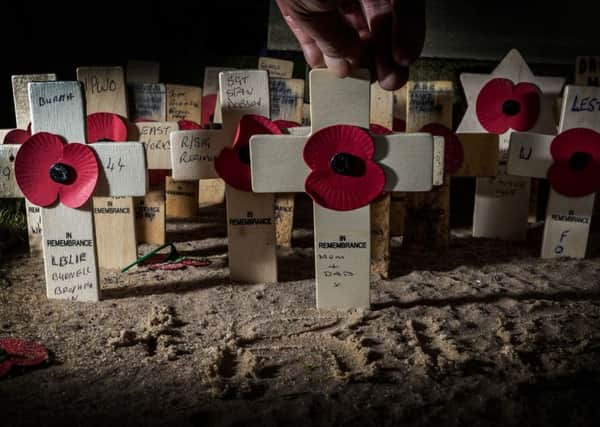Neil McNicholas: Undimmed power of grief amid the sound of silence


There is something particularly powerful in hundreds, perhaps even thousands, of people keeping perfectly silent even for a minute (at sporting events for example) and certainly for as long as two minutes (at services of remembrance). Two minutes can feel like an eternity in the midst of our busy lives of noise and activity, but the gesture is all the more meaningful and powerful for its observance, and it is particularly powerful to see children standing in silence for that length of time.
The silence enables people to pray if they wish, or to at least be reflective in their silence, so why have we suddenly begun to applaud instead?
Advertisement
Hide AdAdvertisement
Hide AdI suspect there may be two reasons for it. The first we can probably blame on political correctness and a desire not to offend those who don’t pray or who don’t believe in God by whatever name. I think this is also the reason why we hear people on television say, for example, “our thoughts are with the family” where at one time they would have said “our thoughts and prayers”. The thing is, though, silence doesn’t impinge on prayer or even reflection, whereas applause does. It’s like adding salt when we’re cooking – once it’s in you can’t take it out again.
The second reason may be that on occasion there is going to be at least one ignoramus who can’t keep their mouth shut and will have to give vent to their ego, and so applause prevents that from happening, or at least it masks it if it does.
But why do we have to sell out to the lowest common denominator in that way, instead of insisting on a higher standard of decency and respect?
Clapping seems to be more common on the Continent, particularly at the likes of football matches. But why do we have to import that particular practice rather than witnessing to how we traditionally show our respect for the dead by creating an opportunity for remembrance in prayer? Applause also seems to happen more when commemorating an individual life rather than the collective loss of the lives of the war dead. It may be a sign of celebration of an individual life and in its own way that may be fine, but it still removes the option of remembering them in prayerful silence – which was the traditional purpose of a period of silence.
Advertisement
Hide AdAdvertisement
Hide AdMight it sadly be the case that we now have a couple of generations who have little or no experience of an appropriate way to show their respect and clapping becomes the default choice? But that’s the point, really, that it’s activity, doing, noise-making. Maybe, too, applause makes it possible for people to avoid having to think too deeply about death and their own mortality.
This Sunday, here in Yarm, we had our usual short service of remembrance in church before our morning Mass, and the two-minute silence was immaculately observed – there wasn’t even a peep out of any of the toddlers in attendance, which in itself was a minor miracle because they have no concept of why there is silence and so you wouldn’t expect them to be quiet.
And then later there was the town’s Service of Remembrance at the War Memorial attended by what must have been a record number of people enjoying the sunshine, and with the High Street closed to traffic, the two-minute silence was again immaculately observed by young and not-so-young alike – a fitting tribute as the names of all those who died in the First and Second World Wars, as well as in Korea, were read out – a list that bore witness to the fact that, in such a small market town at the time, hardly a family can have remained untouched by tragedy.
More power to our national curriculum in ensuring that our children grow up with a knowledge of, and a respect for, the sacrifice that was made by their grandfathers’, great-grandfathers’ and great-great-grandfathers’ generations, “lest they forget”.
Advertisement
Hide AdAdvertisement
Hide AdAt the same time I think we should be concerned that we also don’t forget how we traditionally show respect as a nation. Certainly there would have been partying and cheering in the streets of our towns and cities when war came to an end, but surely a far more appropriate way of showing respect for the fallen and remembering when the guns fell silent, is for us to fall silent also.
Neil McNicholas is a parish priest in Yarm.